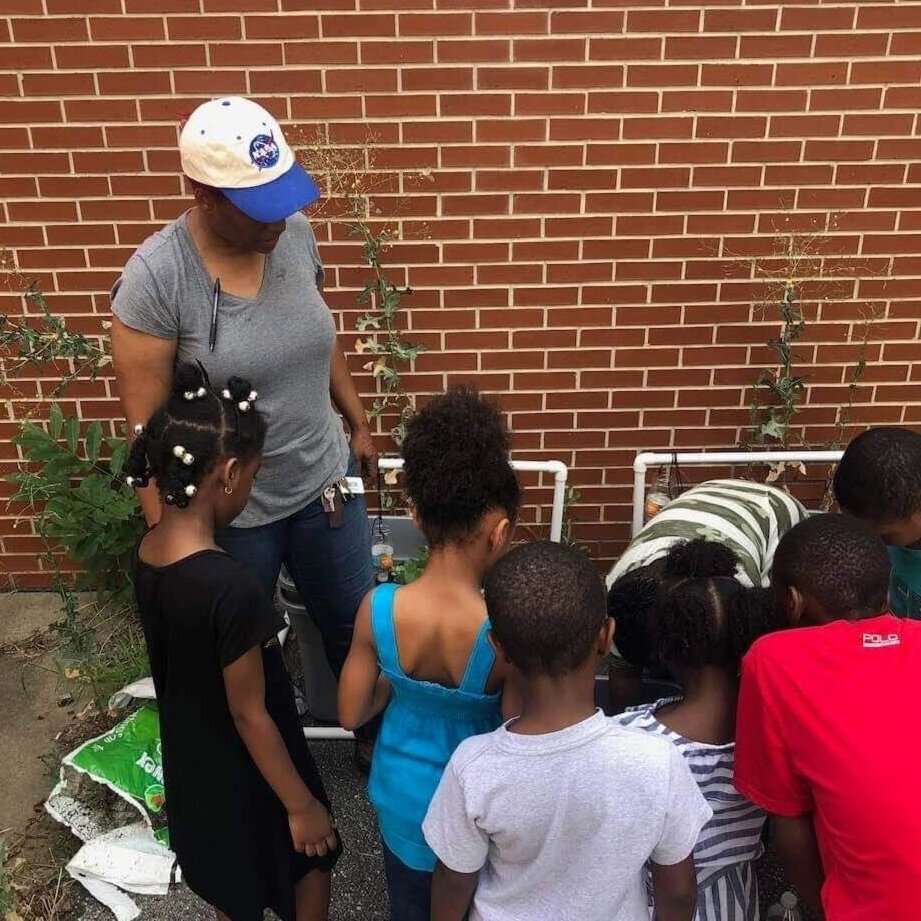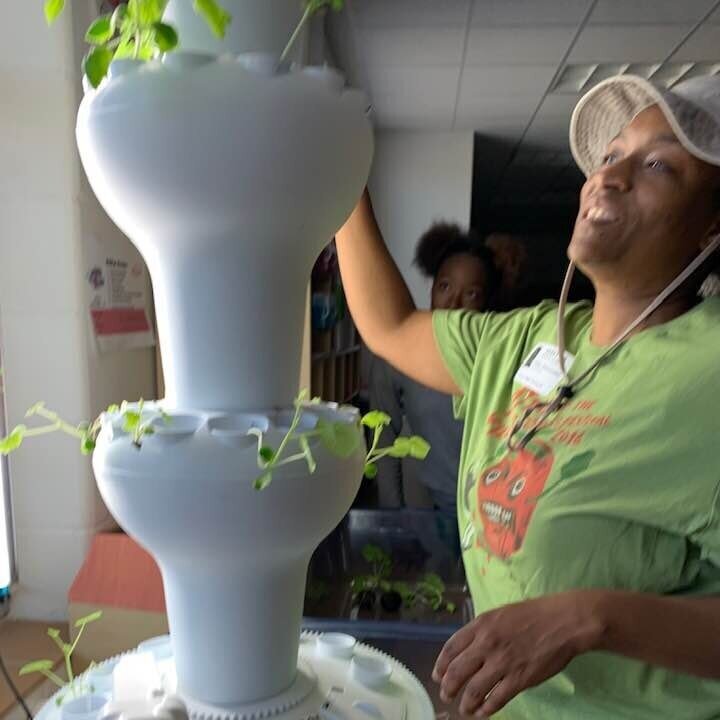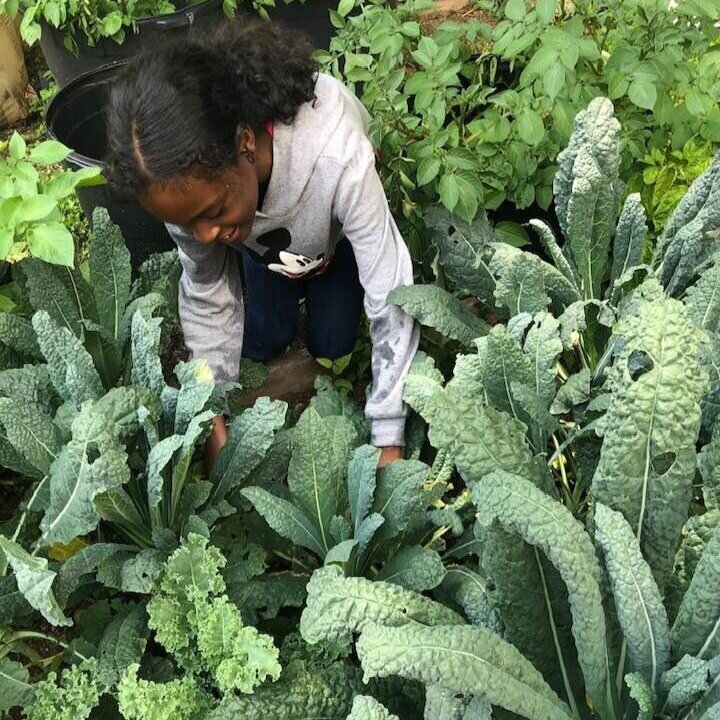By Mary Elizabeth Kidd
Abeika Alexander
Abeika Alexander is a someone with her hands in the deep in the soil and roots of Columbus, especially so in the South Columbus community where she lives and works and has had a vital role establishing numerous community gardens.
When she speaks about the people of Columbus, their food access needs, and the work she’s done and plans to do, it’s hard not to absorb the enthusiasm and passion in her voice. She’s been called Columbus’ “Guerilla Gardener,” and it’s tempting to call her a superwoman. At the end of the day, she’s a woman with a spiritual, impassioned calling and the determination to make her home, and the world, better through the act of growing food and nourishing those around her.
Suzanne Girdner, who leads the Georgia Food Oasis (GFO) program, has known Alexander for around three years and witnesses, first hand, the effect her dedication. “Over the years, I’ve come to see Abeika’s breadth of work as sowing the seeds of community—using all of her personal strengths and interests for growing and tending to a much bigger common good.”
Columbus is a partner community in the Georgia Food Oasis, and it was through the GFO Potluck & Pitch grant program that she pitched and secured a GFO mini-grant of over $400 to establish a community garden at the Liberty Theatre & Cultural Center with the goals of feeding the community and teaching Columbus teens how and why gardening is vital.
The Liberty Theatre holds great significance in the history of Columbus. It opened in 1924 as the city’s segregated theatre, offering movies, plays, and musical performances from entertainers such as Ma Bailey and Cab Calloway. Today, the Liberty Theater & Cultural Center is a place for concerts and community events, and as a partner with the Liberty Theatre, Abeika’s work in its revitalization and sustainability is crucial to ensuring its future. With the grant money from the Georgia Food Oasis and volunteer support from the Columbus chapter of veteran’s service organization The Mission Continues, she established 10 raised beds and began an irrigation system. Click here watch a tour of garden and find out what’s next for the site, including fruit trees, bees, and more, fostering the educational opportunities for the Liberty district and Columbus.
The Liberty Theatre is just one of many ways she’s impacting the city’s urban gardening landscape; she also founded Durty Beets (durtybeets.com/), her business offering vegan catering, private chef services, gardening installation, and garden maintenance. Through Durty Beets she began hosting an urban farmer awards event and farm-focused 5-course vegan dinner called the City Farmers Feast. In its first year alone, the event sold out and became the first-and-only event of its kind in Columbus to celebrate locally-grown food and the farmers who produced it with the goal to “create a ritual around sustainable food sources, food education, food justice and urban farming in Columbus, GA.” While this year’s event has been postponed due to COVID-19, the wheels are turning on its next iteration.
Project-3 volunteers with Abeika Alexander at City Farmers Feast 2019 (photo via Electric City Life)
Project-3 is the non-profit arm of Durty Beets, where she plans to expand her mission of bringing more gardens and more food to the Columbus table. Project-3 originated with a food forest project off the MLK corridor, envisioned as a means of encouraging free public access to fresh fruits and vegetables (more in this feature from Columbus’ Electric City Life); it has now grown to a focus on how to bring more gardens to more back yards. And what she’s trying to learn through both Durty Beets and this non-profit extension of her work is what her Columbus neighbors are going through right now—pandemic and all—and what they need most right now, sometimes going (socially-distanced) door-to-door to figure this out and engage with neighbors about growing good food.
Prior to COVID-19, she was an after-school gardening educator for Columbus-area schools such as Baker Middle School and Carver High School, teaching planting essentials, aquaculture, composting, and more. It’s through this work, and her role as a mother of five, that Abeika is instilling a love of the land, healthy food, and working in the community for generations to come. Her youngest gardens alongside her and is gardening at her school, advocating to establish a school garden.
When speaking to Abeika, you can tell how much pride she takes in this element of her work, passing down this knowledge and passion, seeing her children and Columbus’ next generation continuing this work. “If you love agriculture and gardening, you have to be a source for the community, you cannot hold knowledge like that to yourself,” she says. “You cannot maintain that level of spirituality without sharing it. This is what it means to be a role model to my kids. This is what it looks like to be an advocate.”
We recently spoke to Abeika to further understand what drives Abeika Alexander’s tireless work in Columbus and how she’s staying resilient to her mission through COVID-19.
What brought you to the food movement in Columbus?
I was born and raised in Columbus, and it was my great grandmother’s backyard garden that was my influence in being close to the earth. One of the best memories I had of her is when she’d take me out in the garden while she worked, and she’d sit me in the tall corn stalks. I would be at peace, and she would be at peace.
She would feed me things from the garden…and it was a profound connection. I try to pass that energy along. It taught me how to grow things and how to have respect for life and death. It was essential to who I am and what I do.
Tell us about your work establishing the Liberty Theater Community Garden
We participated in the Georgia Food Oasis Potluck & Pitch in 2019 and won the grant money for supplies, plants, and irrigation. We had building help from Mission Continues in Columbus, and veteran volunteers came out to help build beds. They are a veteran’s organization that focuses on flash builds in green spaces.
Our initial plan was to have classes there again with teenagers who stayed on with us from the Baker Middle School after-school gardening program alongside the summer camp from Georgetown Elementary, but then COVID-19 hit. We had planned to work together on the irrigation system, to work in the raised beds, prepares a meal from the garden, learn basic soil science, etc. Right now, though, I’m working with Dr. Shae Anderson of the Liberty Theater, and we’re trying to take these classes online, so that they will work for people. We’re creating presentations and videos that to educate middle schoolers, but will be perfect for the beginner gardener at any age.
You are so active in so many different areas of food in Columbus, how would you define what you do?
I would describe myself as an urban agriculturist. You cannot be someone who cares about the food system and keep that to yourself, because the food system is comprised of us all. If one part breaks down, it affects all of us.
If I teach someone else to garden, I feel like I’ve done my part to my community. It’s very important to serve your community. It’s not hard for me to share this, because I love it, I love to be in the dirt. I wouldn’t want to be someone else, this allows me to serve however I can.
I’m also hoping that teaching these things will help us put a dent into food apartheid in Columbus and especially that the school systems will take us more seriously. Teachers, principals, and lawmakers need to all have their roles in helping our kids become healthier.
You speak of local food with such a spiritual approach.
My background is Islam, so we are told to be mindful of Mother Earth and to be grateful for what was bestowed to us. No matter your background, you cannot not be mindful of Mother Earth, from conserving water, growing food, giving back to the earth through composting, giving to people.
‘You have to be mindful of Mother Earth.’ That’s what rings in my ear. By my Creator, I have to do this and ask myself ‘how can I be mindful?’ It’s definitely a motivation, being mindful and grateful and driven by that. People are starving and searching for food, and how I can do my part?
You mentioned food apartheid, how do you define this term?
Food apartheid is a comprehensive way of describing the systemic food deficit in mostly black and brown neighborhoods. It is a system that was purposely put in place to sustain food desserts. And even from the origins of the transatlantic slave trade, food in America has been a bargaining chip to keep people down.
You cannot have free people without free land. If you give the land back to the people, it will help to level the playing field. The more we shine a light on this issue, it will create a pathway to justice. People have to be open to hearing the ugly truth. The playing field was not made level.
What is your vision and your hope for your post-COVID-19 work in Columbus?
My vision for brighter days is getting back to making food access easier for people, getting back to the routine of putting gardens in people’s backyards. Through that work, I can answer their questions like: ‘Why do I need to know how to grow something?’ ‘And then…why should I help my neighbor put a garden in her backyard?’
Before, we were out there. We were kicking that stuff off. Now, because of the pandemic, people are more conscious. My hope is that the pause that COVID has given us, the sensationalism behind it, and a new view of health will play in our favor.
So when we’re back, we’re just going to kick back into our same mission, making it easy for folks to have access to food. We want to redefine “fine dining,” and the importance of preserving yourself in what you eat.
There is the opportunity to connect neighbors and connect the importance of the local food system; this time can play in the favor of anyone advocating for food justice. We have to first build a web of people who are empowered in the city and then hopefully we can translate that to the state, then many states, and the country.
Overall, I’d say we’re trying to reinstate love and that connection back to earth.
Mary Elizabeth Kidd is Georgia Organics’ Communications Manager. She can be reached at maryelizabeth@georgiaorganics.org. Lauren Cox is the Organic Procurement Coordinator at Georgia Organics and can be reached at laurencox@georgiaorganics.org. To learn more about Georgia Organics, visit www.georgiaorganics.org and follow us on Instagram @GeorgiaOrganics, Twitter @GeorgiaOrganics, and at www.Facebook.com/GeorgiaOrganics.






